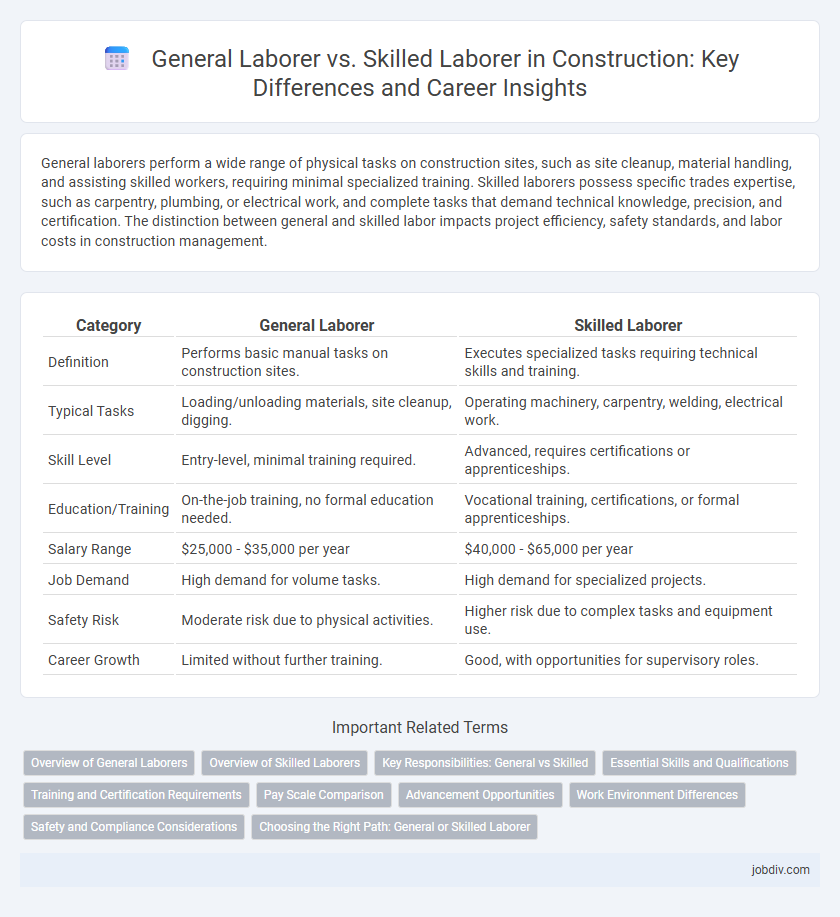General laborers perform a wide range of physical tasks on construction sites, such as site cleanup, material handling, and assisting skilled workers, requiring minimal specialized training. Skilled laborers possess specific trades expertise, such as carpentry, plumbing, or electrical work, and complete tasks that demand technical knowledge, precision, and certification. The distinction between general and skilled labor impacts project efficiency, safety standards, and labor costs in construction management.
Table of Comparison
| Category | General Laborer | Skilled Laborer |
|---|---|---|
| Definition | Performs basic manual tasks on construction sites. | Executes specialized tasks requiring technical skills and training. |
| Typical Tasks | Loading/unloading materials, site cleanup, digging. | Operating machinery, carpentry, welding, electrical work. |
| Skill Level | Entry-level, minimal training required. | Advanced, requires certifications or apprenticeships. |
| Education/Training | On-the-job training, no formal education needed. | Vocational training, certifications, or formal apprenticeships. |
| Salary Range | $25,000 - $35,000 per year | $40,000 - $65,000 per year |
| Job Demand | High demand for volume tasks. | High demand for specialized projects. |
| Safety Risk | Moderate risk due to physical activities. | Higher risk due to complex tasks and equipment use. |
| Career Growth | Limited without further training. | Good, with opportunities for supervisory roles. |
Overview of General Laborers
General laborers in construction perform essential tasks such as site preparation, material handling, and equipment operation that support skilled tradespeople. They are responsible for maintaining a clean and safe work environment, assisting with demolition, and loading or unloading supplies, which requires physical endurance and basic construction knowledge. Unlike skilled laborers, general laborers often do not require specialized training or certifications but play a crucial role in project efficiency and workflow continuity.
Overview of Skilled Laborers
Skilled laborers in construction possess specialized training and experience in trades such as carpentry, plumbing, electrical work, and masonry, enabling them to perform complex tasks with precision. Their expertise contributes to higher quality outcomes, increased job efficiency, and enhanced safety on construction sites. Certification and apprenticeships often define the skill level of these workers, distinguishing them from general laborers who handle more manual, unskilled tasks.
Key Responsibilities: General vs Skilled
General laborers handle basic tasks such as site cleanup, material transport, and equipment setup, supporting the overall construction workflow without requiring specialized training. Skilled laborers perform complex duties like operating machinery, reading blueprints, and executing precise installations, relying on specific certifications and technical expertise. The distinction in key responsibilities directly impacts project efficiency and quality, with skilled laborers addressing specialized needs that general laborers cannot fulfill.
Essential Skills and Qualifications
General laborers in construction possess fundamental skills such as physical stamina, basic tool operation, and site cleanup, requiring minimal formal training or certification. Skilled laborers, however, must have specialized qualifications like welding certification, electrical licenses, or proficiency in heavy machinery operation, often achieved through apprenticeships or technical education. These essential skills enable skilled laborers to perform complex tasks that demand precision, safety knowledge, and compliance with industry standards.
Training and Certification Requirements
Skilled laborers in construction typically require formal training and certification in specialized trades such as electrical work, plumbing, or welding, ensuring compliance with safety standards and industry regulations. General laborers often receive on-the-job training with minimal certification requirements, focusing on tasks like site preparation and material handling. Certification programs for skilled laborers enhance job opportunities and often mandate renewal to maintain proficiency and safety compliance.
Pay Scale Comparison
General laborers in construction typically earn an hourly wage ranging from $12 to $18, depending on location and experience, while skilled laborers command higher pay, often between $20 and $35 per hour due to specialized training and certifications. The wage disparity reflects the complexity of tasks performed, with skilled laborers handling intricate jobs like electrical work, plumbing, or equipment operation. Employers often offer additional benefits and overtime opportunities to skilled laborers, further enhancing their overall compensation compared to general laborers.
Advancement Opportunities
Skilled laborers in construction often experience greater advancement opportunities due to their specialized training and certifications, enabling them to take on supervisory roles or specialize in trades like electrical or plumbing. General laborers typically perform foundational tasks with limited specialization, often requiring additional training or apprenticeships to progress into skilled positions. Companies prioritize promoting skilled laborers for higher wages and leadership roles because their expertise directly impacts project quality and efficiency.
Work Environment Differences
General laborers typically perform physically demanding tasks such as loading materials, site cleanup, and assisting skilled trades, often in outdoor or variable weather conditions. Skilled laborers operate with specialized tools and techniques in more controlled environments like workshops or specific construction zones requiring precision and safety protocols. Work environment differences influence job responsibilities, hazard exposure, and required expertise levels on construction sites.
Safety and Compliance Considerations
General laborers in construction focus on basic tasks with limited training, requiring strict adherence to safety protocols to minimize risks from manual handling and equipment use. Skilled laborers possess specialized training and certifications, enabling them to operate complex machinery and perform high-risk tasks while ensuring compliance with OSHA regulations and site-specific safety standards. Both roles demand rigorous use of personal protective equipment (PPE) and continuous safety education to prevent workplace accidents and maintain regulatory compliance.
Choosing the Right Path: General or Skilled Laborer
Choosing the right path between general laborer and skilled laborer depends on your long-term career goals, required training, and job responsibilities. General laborers perform essential physical tasks like site cleanup and material handling, while skilled laborers possess specialized skills in trades such as carpentry, plumbing, or electrical work, often earning higher wages. Assessing factors like apprenticeship opportunities, certification requirements, and desired expertise helps determine which role aligns best with your construction career aspirations.
General Laborer vs Skilled Laborer Infographic

 jobdiv.com
jobdiv.com